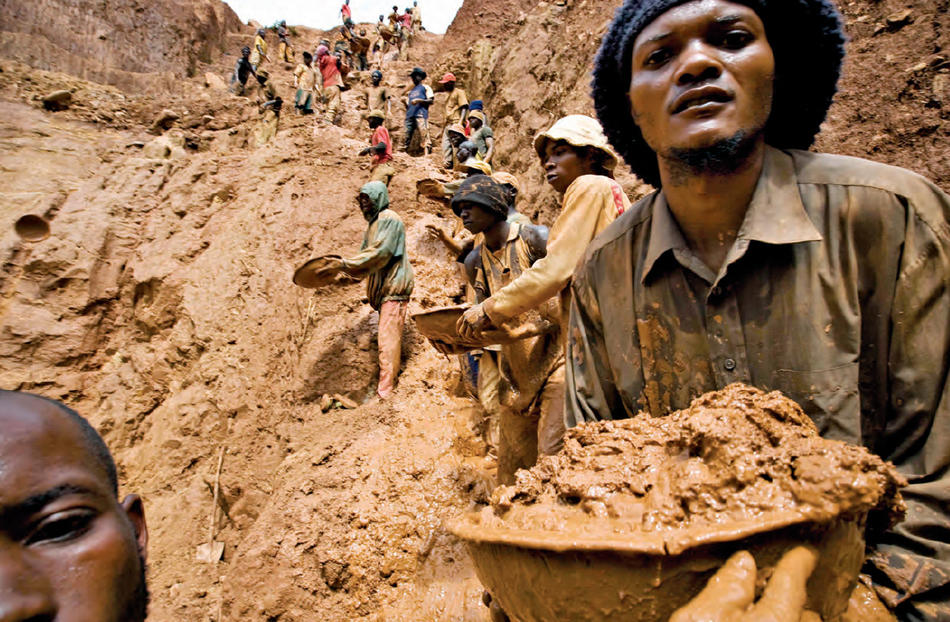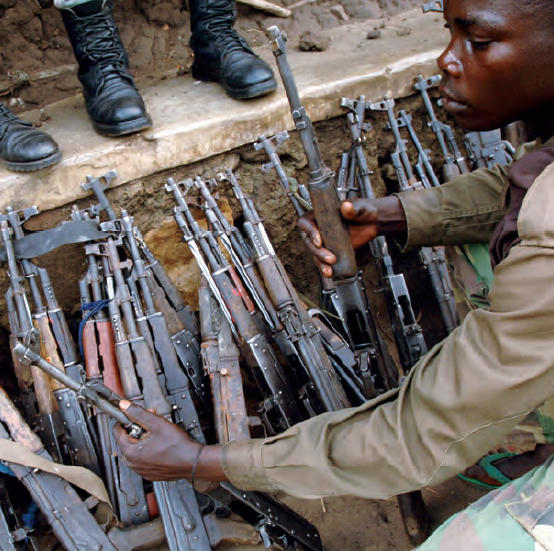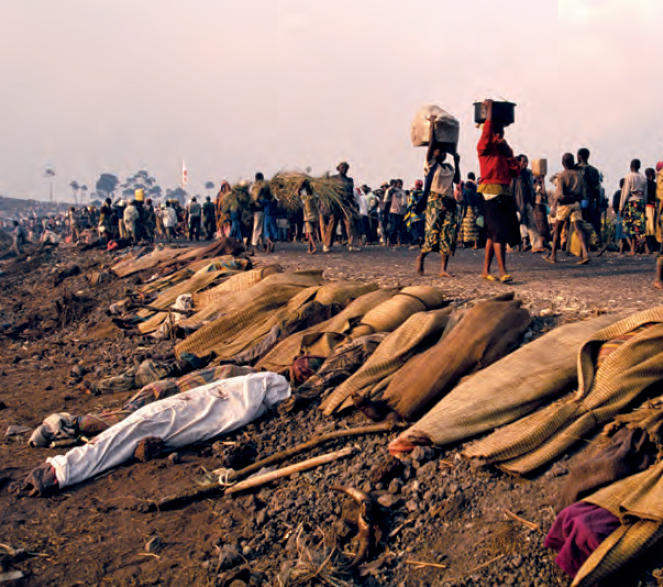"Pile the bodies high at Austerlitz and Waterloo. Shovel them under and let me work — I am the grass; I cover all." — Carl Sandburg
There is not enough grass in Rwanda. On April 6, 1994, after decades of clashes between the Hutu government and Tutsi rebels, two surface-to-air missiles struck a plane carrying the Rwandan leader Juvénal Habyarimana. The flaming aircraft crashed into the garden of the presidential palace and disintegrated. Within hours of the attack, thousands of Hutus — incited by the government and goaded by the media — began sweeping through the small African nation, butchering civilians with the half million machetes the government had stockpiled for just such an opportunity. Over the next three months, 800,000 Tutsis died at the hands of the Hutu majority.
Seven years later, James Stewart ’13LAW, a twenty-five-year-old New Zealander, visited the ravaged nation for the first time and saw what the grass had yet to cover: open pits containing thousands of dead bodies preserved in lime. As a legal intern in the Office of the Prosecutor for the International Criminal Tribunal for Rwanda, in Arusha, Tanzania, Stewart had come to investigate the murder, torture, and rape of Tutsis in the city of Butare.
One woman came to meet him after a long day’s walk. Over the course of several hours, she spoke about being raped thirty-five times, then being thrown down a well with the body parts of her family.
“When your imagination has been brought very close to the reality of what this looks like and how this felt for people, it’s disorienting,” Stewart says. “I didn’t understand any more what it meant, how the world was made up, what was really going on. How could we Westerners tolerate this?”
The experience set Stewart on his path. In the dozen years since, he has produced a body of work that is helping to slowly change the calculus of war atrocities. And he’s done it by recovering an old, neglected tactic: going after the international corporations that profit from the violence.
A Legal Framework
In the new glass-and-concrete law-school building at the University of British Columbia, Stewart, thirty-seven, enjoys a moment of peace. His office is white and spartan and smells of new carpet. The building’s eastern views hold Vancouver’s skyline and the mountains beyond. Stewart’s wide office window opens onto the Pacific.
“Have you ever met any human-rights defenders from third-world countries?” he says. “It’s terrifying to imagine the courage it takes to do what they do. I live in a damn nice city. I have a nice lifestyle. But I have seen some really bad things. If addressing these politically sensitive issues is what it takes to make a difference, then so be it.”
As a prosecutor and legal adviser for war-crimes tribunals, Stewart has spent years shifting between the killing fields of Central Africa and the courtrooms and relief organizations that are largely powerless to stop the slaughter. While the international justice system has grown incrementally more adept at punishing human-rights abuses in war-torn areas, the prosecutions are largely after the fact: very little is being done to prevent war atrocities against civilian populations.
Stewart’s research paper “Corporate War Crimes,” which he wrote in 2010 while working toward his JSD at Columbia, examined the responsibility of the extractive industries for illegally exploiting natural resources in modern war zones, and offered national and international courts a new tool: a legal framework to hold the natural-resource industry accountable for crimes against humanity.
The Business of War
While most war atrocities are committed by rebel groups or military units that operate outside the law, Stewart says, these groups “are almost entirely dependent upon commercial actors to purchase, transport, and market the illegally acquired resources in order to sustain the violence.” The cycle of destruction works this way: locals illegally exploit resources such as metals and minerals and sell them to the natural- resources industry, earning money to buy weapons from foreign arms manufacturers, which they use to perpetrate horrendous acts. The self-sustaining loop operates outside the realm of national or international law, leading to large-scale crimes against the local populations.
“Armed groups often vie for control over resource-rich areas,” says Stewart, “bringing with them waves of violence as towns fall under the control of competing military groups. Often, the intensity of this violence is directly tied to demand from Western markets, like when a major new game console enters the market before Christmas, or when regulators ban lead in circuit boards, causing a spike in global demand for the only substitute, tin.”
Holding corporations accountable, then, creates incentives for warring parties to observe the laws of war — a way to alter the trajectory of conflicts as they happen rather than waiting out the bloodshed and mopping up afterward.
Court Dreams
Stewart was never allowed toy guns as a kid. Raised in Wellington, New Zealand, he devoted himself to tennis, hoping one day to play professionally. Off the courts, he read books about New Zealander soldiers in World War I, and was stunned by the horror of trench warfare. “In these testimonies I read, people said they couldn’t open their mouths without getting a mouthful of flies. Then someone would blow a whistle, you’d go over the top, and most of your friends would be massacred. That was insane.” As Stewart engaged with this material, it produced in him a desire to understand the type of madness that led to these awful events.
Three days after finishing his law degree at Victoria University, Stewart moved to Florida to teach at the Saddlebrook Tennis Academy, where he met players like Pete Sampras, Martina Hingis, and Jennifer Capriati. After a year, he realized that he’d never turn pro, and decided to use his law degree to explore the questions that had haunted him since childhood. He left the clay courts and manicured lawns of Saddlebrook and was soon walking among the mass graves of Rwanda.
There, he recorded first-person accounts of gang rapes and butchered families — stories from a genocide that had unfolded while the American media fixated on the O. J. Simpson case. The motto of the Hutu slaughter was “Leave none to tell the story.” But even if they did, the West didn’t seem to be listening.
As Stewart carried out his research in Rwanda, he looked across the border and saw the Democratic Republic of the Congo (DRC) descending into turmoil.
The Great War
The Second Congo War, also known as the Great War of Africa, was the deadliest conflict since World War II. Preceded by a series of massacres and cross-border skirmishes in the 1990s, the war displaced millions of refugees as it spread across eight nations between 1998 and 2003, ultimately killing more than five million people, the vast majority of them civilians.
It took less than a year for arms manufacturers and mining interests to turn the localized Congo War into a transcontinental resource grab for tin, tungsten, tantalum, gold, and diamonds, without regard for the environment or the local populations enslaved or destroyed in the process. Stewart saw the same patterns of plunder, death, and Western indifference that had plagued Rwanda.
“After my time in Rwanda, the DRC became my problem,” Stewart says. “I had met Jewish people for whom the Holocaust was a personal problem. Although the Holocaust was always a huge moral shock to me, it wasn’t until I worked with victims of atrocity in Africa that the DRC became for me a day-to-day personal problem.”
According to a scathing 2001 United Nations report, “The conflict in the Democratic Republic of the Congo, because of its lucrative nature, has created a ‘win-win’ situation for all belligerents. Adversaries and enemies are at times partners in business ... prisoners of Hutu origin are mine workers of [the Rwandan Patriotic Army], enemies get weapons from the same dealers and use the same intermediaries. Business has superseded security concerns. The only loser in this huge business venture is the Congolese people.”
The Crime of Pillage
The term “pillage” may call to mind something as remote and antiquated as the fifth-century rampages of the Huns, but Stewart saw firsthand — in Rwanda, the Congo, and the former Yugoslavia — the results of modern pillage and the war economy it produces. He also saw the legal world’s ineffectiveness at preventing these catastrophes, focusing as it did on “transitional justice” — prosecuting crimes such as rape, torture, and genocide after the damage has been done.
Most international criminal courts, Stewart says, target those “who bear the greatest responsibility” — the physical perpetrators — “instead of prosecuting corporate enablers who are more easily apprehended and more easily deterred by the threat of criminal prosecution.”
But what does pillage mean, exactly?
In “Corporate War Crimes,” Stewart explains that plunder and pillage are “legally synonymous” and often interchangeable. Both describe theft during wartime. The International Criminal Tribunal for the former Yugoslavia defined plunder as embracing “all forms of unlawful appropriation of property in armed conflict for which individual criminal responsibility attaches under international law, including those acts traditionally described as ‘pillage.’”
In 2004, Stewart, working as a legal adviser for the International Committee of the Red Cross (ICRC), was asked to write a pamphlet on the relationship between the laws of war and businesses. When he finished, he offered to write a much broader study on corporate responsibility for pillaging natural resources. But his superiors at the ICRC, aware of the pillage cases from World War II, weren’t sure how or if they might apply to modern resource wars in Africa. “‘Using pillage to hold corporations criminally responsible for buying resources is a very avant-garde idea,’ they told me,” Stewart says. “‘We think it’s too radical. We’re not sure it works. We’re not sure the legal basis is there to make this work.’”
Stewart remembered those words when he came to Columbia in 2007. An academic at heart, he took up an associate-in-law position (a two-year teaching fellowship at Columbia Law School) and pursued his JSD (the legal equivalent of a PhD) in the area of corporate responsibility for international crimes.
“Pillage had been prosecuted as a war crime after World War II, but it had then largely fallen off the map of modern thinking about war crimes,” says Sarah Cleveland, the Louis Henkin Professor of Human and Constitutional Rights at Columbia Law School, who advised Stewart in his writing. “Exploitation of natural resources such as oil, diamonds, gold, and ivory has been critical to supporting many of the world’s most intractable armed conflicts, and James’s work has put new tools on the table to help us confront these challenges.”
In Belgium, for example, an investigation is underway over the pillage of diamonds in Sierra Leone, in which prosecutors are using a French translation of “Corporate War Crimes” to prosecute a Belgian businessman allegedly involved in the illegal diamond trade. Stewart is also pressing his case personally: in 2010, at the Peace Palace in The Hague, he addressed three hundred judges, prosecutors, members of civil society, and scholars, all of them seeking that elusive legal basis to hold corporations accountable for pillaging natural resources — no longer such a radical idea. That same year he used “Corporate War Crimes” to train prosecutors from twelve different legal systems at the International Criminal Court, and was invited back to instruct a group of European prosecutors this fall.
Back on the Radar
The concept of pillage as a war crime is enshrined in the Hague Regulations of 1907 and the Geneva Conventions of 1949. It is at the heart of Stewart’s work, because it allows for criminal liability. Civil penalties, in the rare instances when they are awarded, are a slap on the wrist to extremely profitable corporations. When Shell Oil was accused of collaborating with the Nigerian government in 1993 to execute environmentalists and tribal leaders, the company, which asserted its innocence, eventually settled for $15.5 million — a parking ticket for a business that generated $467 billion in revenue in 2012.
“Businesses just write off the cost of the loss on these sorts of issues and build it into the cost of the widgets that they’re selling and pass that cost on to consumers,” Stewart says. “So there’s a concern that civil liability isn’t really something that organizations feel terribly acutely, particularly if the entire industry is undertaking those sorts of practices.”
Meanwhile, over the thirteen years the Shell case dragged on, the company was repeatedly accused of funding armed groups to murder civilian activists, polluting the drinking water with benzene, and grossly underreporting oil spills, which it accomplished, according to a leaked US embassy cable, by planting operatives throughout the Nigerian government.
“Criminal responsibility creates different incentives,” says Stewart. “Criminal law can reach into a corporation, take individual CEOs and employees, and call them to account for their actions. It can also hold corporations themselves criminally responsible. When applied to international crimes, these possibilities change the ball game. You don’t need to prosecute every single incident to have a massive effect on the industry. You prosecute a few cases successfully, and it will send a clear message that will change the way conflicts are financed and the way weapons are transferred into conflict zones.”
Criminal liability also has the power to stigmatize a corporation, as it did with the accounting company Arthur Andersen, which all but folded after it was convicted of obstruction of justice for shredding documents during the 2001 Enron scandal. If public shaming can bring down a single company, says Stewart, imagine the impact it can have on an entire industry. He notes that after animal-rights activists targeted the fur market in the 1980s, fur sales dropped by nearly half. “It shifted the way people think about wearing furs on moral grounds almost instantaneously,” he says.
Targeting Arms
Stewart’s current project picks up from his Columbia work on corporate accountability, looking at the possibility of holding arms vendors who sell weapons to combatants responsible as accomplices in the atrocities enabled by their merchandise.
Stewart maintains that meaningful international arms regulation is unlikely. This past April, the United Nations, after nearly a decade of fighting organizations such as the National Rifle Association, finally adopted the Arms Trade Treaty, a step that Stewart views as positive but inadequate.
“I’ve always felt we shouldn’t be too sanguine about the value of a treaty,” he says. “Generally, treaties are important, but it’s difficult for me to imagine that states would actually agree to have any type of independent scrutiny over their weapons transfers. And even if they did, it’s difficult to imagine that we’re ever going to hold people individually accountable for those types of transfers. You already have a network of courts able to do that work, and they have real teeth in ways that initiatives like the Arms Trade Treaty will probably not.”
Which is why Stewart believes the best way to curb unfettered arms trade is through national courts rather than waiting for global cooperation. Following World War II, national courts held corporate representatives accountable for a range of war crimes, as they did with the German businessman who pillaged one hundred million tons of ore from France, the director of the Dresden Bank who mediated the transfer of Jewish property to German hands, and the business partners who sold the Nazis large quantities of Zyklon B, the poison chemical used in the gas chambers.
In the last case, the United Nations War Crimes Commission described the transaction as “a clear example of the application of the rule that the provisions of the laws and customs of war are addressed not only to combatants and to members of state and other public authorities, but to anybody who is in a position to assist in their violation.”
“Crimes against international law,” the Nuremberg Tribunal ultimately concluded, “are committed by men, not by abstract entities.” National courts are now rediscovering the precedent set by these cases, using them as an alternative to ineffectual international law. In 2000, the Rwandan director of a tea factory was convicted of crimes against humanity for failing to restrain or punish the genocidal acts of his employees. In the Netherlands in 2007, a Dutch businessman received seventeen years in prison for selling chemicals to Iraq that were turned into mustard gas to be used on the Kurds.
“This is very bitter medicine to swallow,” says Stewart, “and states hate prosecuting their own corporate nationals. But it started happening in part because of the pressure that the International Criminal Court creates, since its jurisdiction is based on the idea that the national system didn’t prosecute these people. What I’m most interested in is states prosecuting their own corporate nationals for these sorts of crimes. There’s a much stronger sense of legitimacy in that process.”
But Stewart is not out to shut down the weapons and extractive industries. He does want them to be more vigilant in making sure their commerce doesn’t support atrocities.
“If what I was saying was something like, ‘You can’t sell weapons to Africans,’ then my project would be ridiculous,” Stewart says. “Africans have a right to weapons, provided they don’t use those weapons to commit international crimes. You have to do some pretty bad things to be guilty of a war crime with weapons. The message really is, you have to comply with the laws of war. You can sell weapons to people who comply with the laws of war.”
The Rising Tide
The credibility of Stewart’s approach is reflected in the surge of attention he has received. Over the past few years, he’s won the Cassese Prize for International Criminal Law Studies; Canada’s Aurora Prize, awarded to top emerging scholars; and an Open Society Initiative fellowship.
“Stewart is a consummate scholar unafraid to bring his conscience into his work,” says Peter Rosenblum, a professor at Bard College and a former human-rights-law professor at Columbia, where he was on Stewart’s JSD committee. “He’s the hedgehog of pillage — he knows everything about it. The idea of prosecuting corporations had been there from the beginning, but we stopped looking at those who were prospering. Stewart connected the dots between pillage and the idea of international accountability.”
Stewart acknowledges the powerful forces in his way, and, as Rosenblum confirms, they’re not just big businesses.
“It always takes a special will from a government to pursue these cases,” Rosenblum says, “and we’re not seeing a lot of that.”
But Stewart believes there is no turning back.
“If you look at the ways in which societies have developed and the fights that have been fought — women’s rights, racial equality, sexual orientation — I think this is the next one,” he says. “I don’t think of it as a battle. I think of it as a tide. I think it’s inevitable.”






